Key takeaways:
- Film editing challenges include maintaining emotional resonance, dealing with excessive footage, and managing continuity and pacing.
- Successful editing requires a blend of technical skills, emotional intelligence, and adaptability to unforeseen circumstances.
- Lessons from editing experiences emphasize the importance of patience, sound design in storytelling, and embracing imperfection for emotional depth.
- Aspiring editors should focus on storytelling, network within the film community, and embrace experimentation to foster creativity.
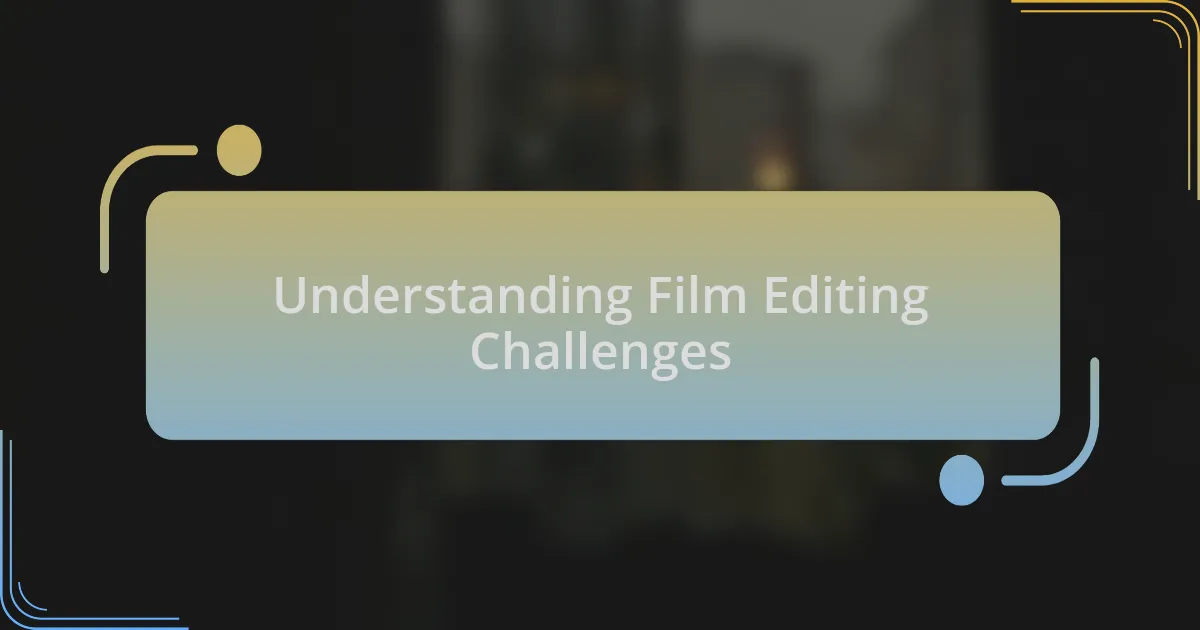
Understanding Film Editing Challenges
Editing a film is not just about cutting footage; it’s an intricate dance of storytelling, pacing, and emotion. I remember a project where I struggled to find the perfect rhythm for a crucial scene. The endless adjustments left me wondering, how do you maintain emotional resonance while slicing through the chaos?
One of the most daunting aspects of editing is dealing with an overwhelming amount of footage. I found myself staring at hours of raw clips, questioning what to keep and what to discard. Have you ever felt paralyzed by choice? Embracing this challenge meant trusting my instincts and remembering that each clip should serve the narrative.
Then comes the constant battle between the vision and the limitations of the footage. In one project, I had to work with problematic audio that threatened to derail the entire scene. I learned to adapt, creatively using sound design to replace missing elements. It’s fascinating how constraints can spark innovative solutions, don’t you think?
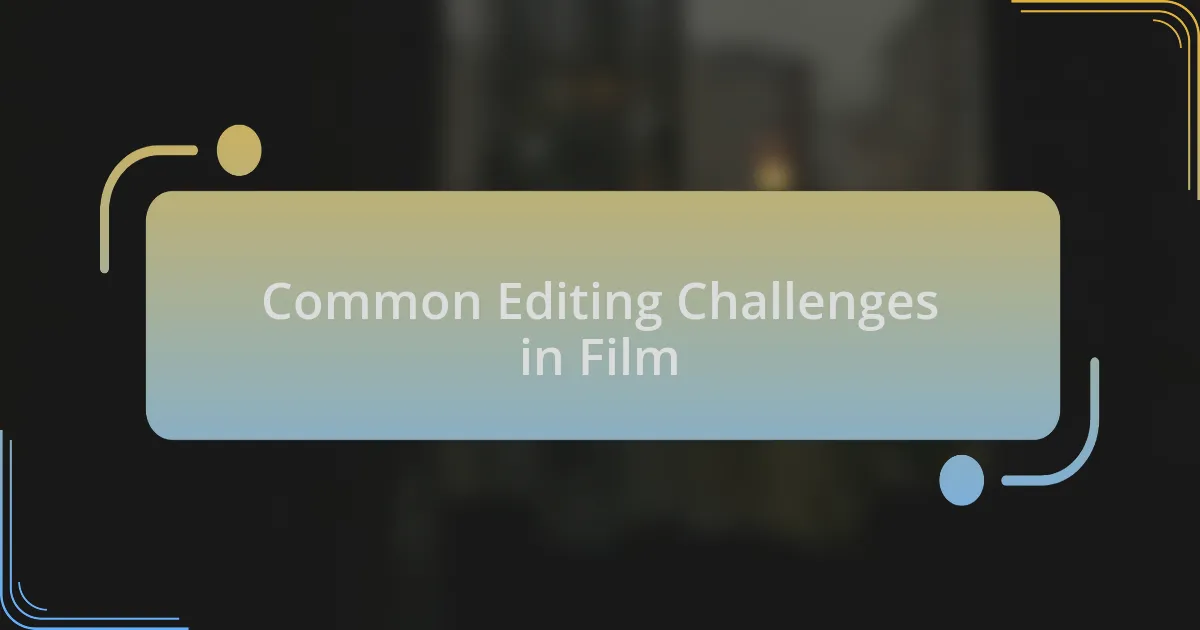
Common Editing Challenges in Film
One common challenge I often face during editing is maintaining continuity. In one particular film, I had to piece together multiple takes shot on different days, and it felt like solving a complicated jigsaw puzzle. I found myself obsessing over even the tiniest details, like a character’s placement or the lighting changes. It really made me question, how do you ensure that viewers remain immersed in the story without being jolted out of it by inconsistencies?
Another hurdle that frequently arises is the emotional pacing of a scene. I vividly recall a time when I edited a dramatic confrontation between characters. The initial cut felt rushed, stripping away the weight of their conflict. After countless revisions, I realized that sometimes slowing down the tempo allows emotions to breathe, creating a more impactful moment. Isn’t it fascinating how timing can transform a scene from ordinary to unforgettable?
Then there’s the pressure of fitting everything within a specific runtime. During a recent project, I was faced with the difficult task of trimming down a poignant scene I adored. I struggled to let go of certain lines that felt integral to the storytelling. Ultimately, I learned that every decision should serve the film’s overall vision. It begs the question: how do you prioritize your emotional attachment to specific moments versus what’s best for the story as a whole?
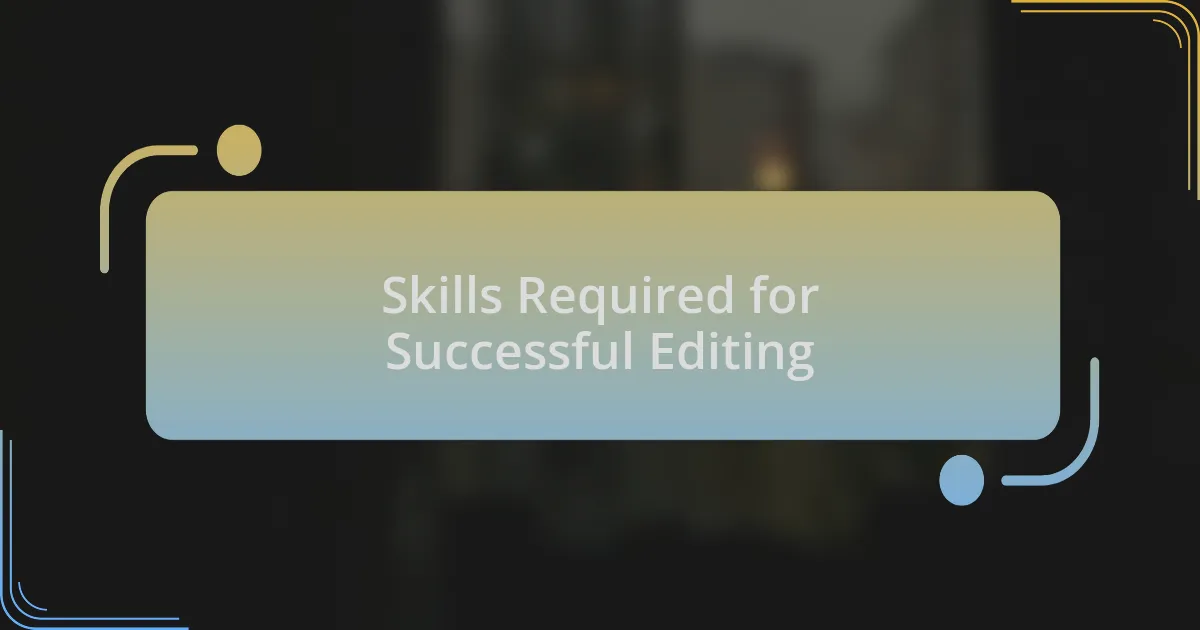
Skills Required for Successful Editing
Successful editing hinges on a blend of technical and creative skills. My keen eye for detail has helped me catch inconsistencies that might otherwise slip by unnoticed. For instance, while working on a short film, I discovered a subtle wardrobe change in a crucial scene; it required a total rework of the sequence. Isn’t it interesting how a single oversight can disrupt a viewer’s immersion?
In addition to technical prowess, emotional intelligence plays a paramount role in the editing suite. During the editing of a romantic scene, I found myself deeply connected to the characters’ struggles, which made it challenging to deliver a balanced portrayal. It taught me that empathy must guide the editing process, allowing the essence of the narrative to resonate authentically with the audience. How do we ensure that our emotions enhance the story rather than cloud it with personal bias?
Another essential skill I’ve honed is adaptability. I recall a project where the original vision had to shift dramatically due to unforeseen circumstances. As the editor, I had to embrace sudden changes—reshaping scenes and reimagining transitions on the fly. This experience reinforced my belief that flexibility is not just an editing skill; it’s an essential mindset in film production. How often do we underestimate the importance of being open to change in a creative field?
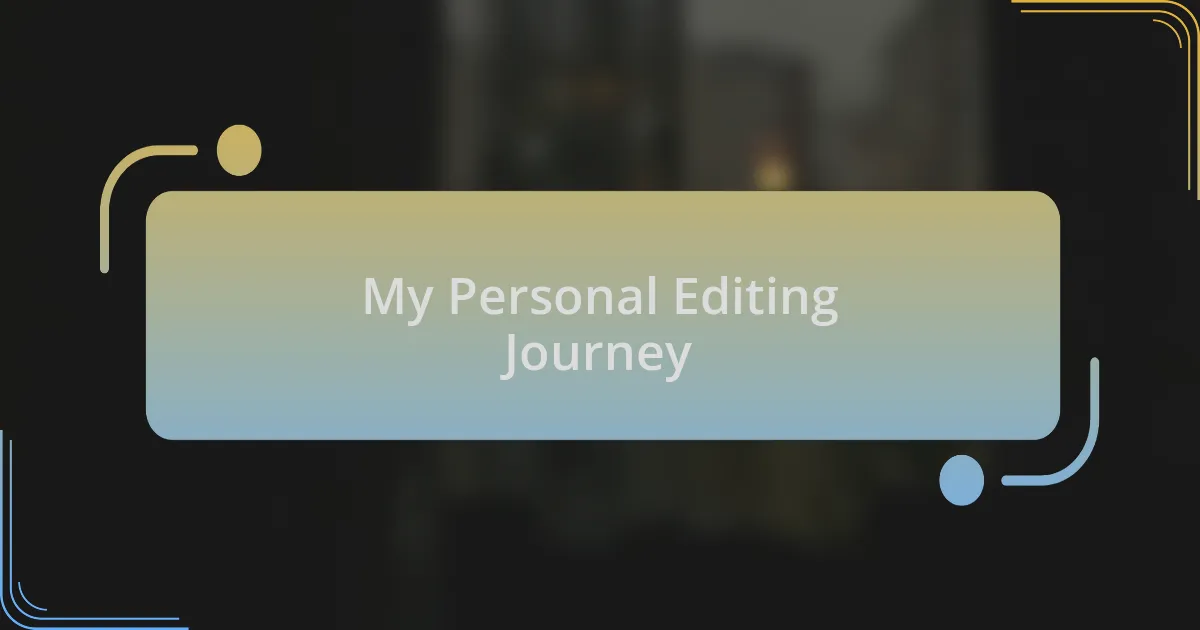
My Personal Editing Journey
Editing is often seen as a technical process, but my personal journey has taught me it is so much more. During my first significant project, I was overwhelmed by the sheer volume of footage. Yet, as I started piecing it together, I discovered that storytelling went beyond the clips; it was about finding emotional connections. In one scene, I had to choose between two takes. I remember feeling a tug at my heartstrings as one revealed more vulnerability than the other. How often do editors face these pivotal moments that can change the entire narrative arc?
I distinctly recall a time when I lost a crucial segment of a documentary I was editing because of a software glitch. The panic was palpable, but it forced me to recreate the scene using only my memory and the remaining footage. This daunting task turned into a blessing in disguise, pushing me to explore alternative storytelling techniques. This experience reinforced my belief in the resilience we must cultivate as editors—how do we turn obstacles into opportunities for creativity?
As I navigated through various projects, I learned the power of collaboration. In a recent film, active discussions with the director transformed my approach to pacing. I initially had a fast rhythm in mind, but feedback led us to slow down in critical moments, allowing audience emotions to breathe. This taught me that editing isn’t a solitary endeavor but a collective art. How frequently do we overlook the wisdom that comes from sharing our journey with others in the industry?
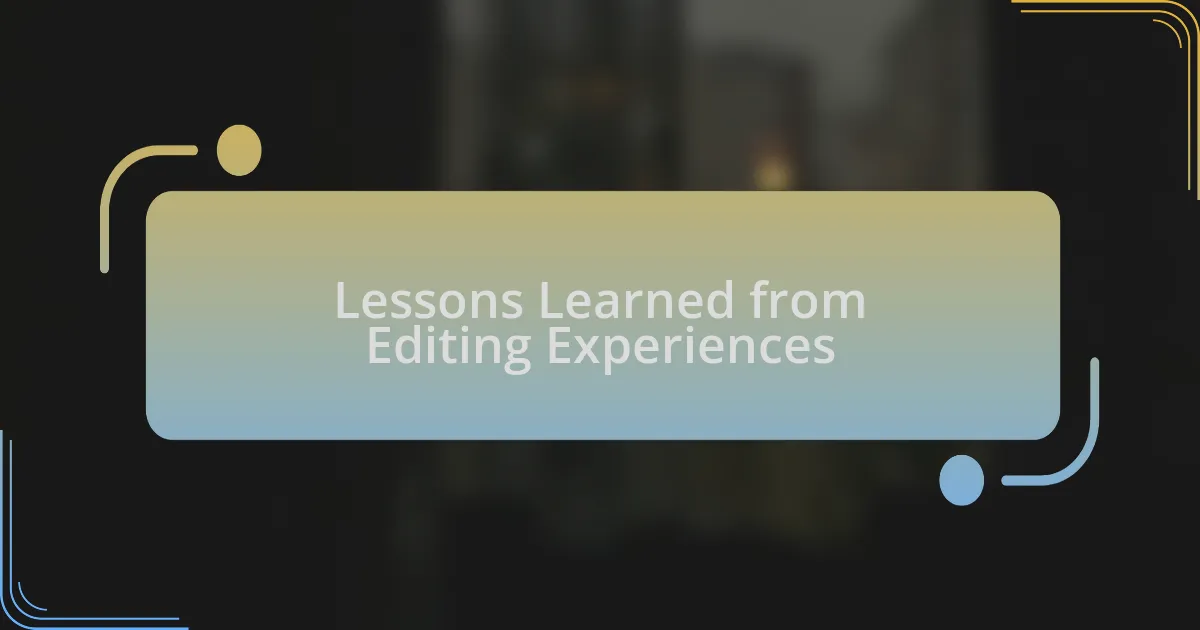
Lessons Learned from Editing Experiences
One of the most significant lessons I’ve learned through editing is the importance of patience. I remember a grueling week spent fine-tuning a short film that just wouldn’t click. Frustrated, I found myself obsessing over minor details that ultimately didn’t serve the story. Stepping back and allowing some time away from the project gave me clarity, helping me see the bigger picture. Have you ever felt that a little distance can reveal fresh perspectives?
Another profound takeaway emerged when I realized the impact of sound design on storytelling. I was knee-deep in editing a dramatic scene when I decided to test different soundscapes. Initially, the visual elements felt flat, but when I layered in ambient sounds, the entire mood transformed. This taught me that editing goes beyond visuals—it’s about creating an atmosphere that resonates with the audience. How often do we overlook the auditory side of our projects during the editing process?
Lastly, I found that embracing imperfection can lead to unexpected breakthroughs. During a project, I grappled with a shaky camera shot that I initially wanted to discard. However, instead of cutting it, I integrated it into the narrative, turning it into a raw moment of authenticity that struck a chord with viewers. This experience cemented the idea that flaws can often enhance a story’s emotional depth. Isn’t it fascinating how sometimes our greatest assets can emerge from perceived mistakes?
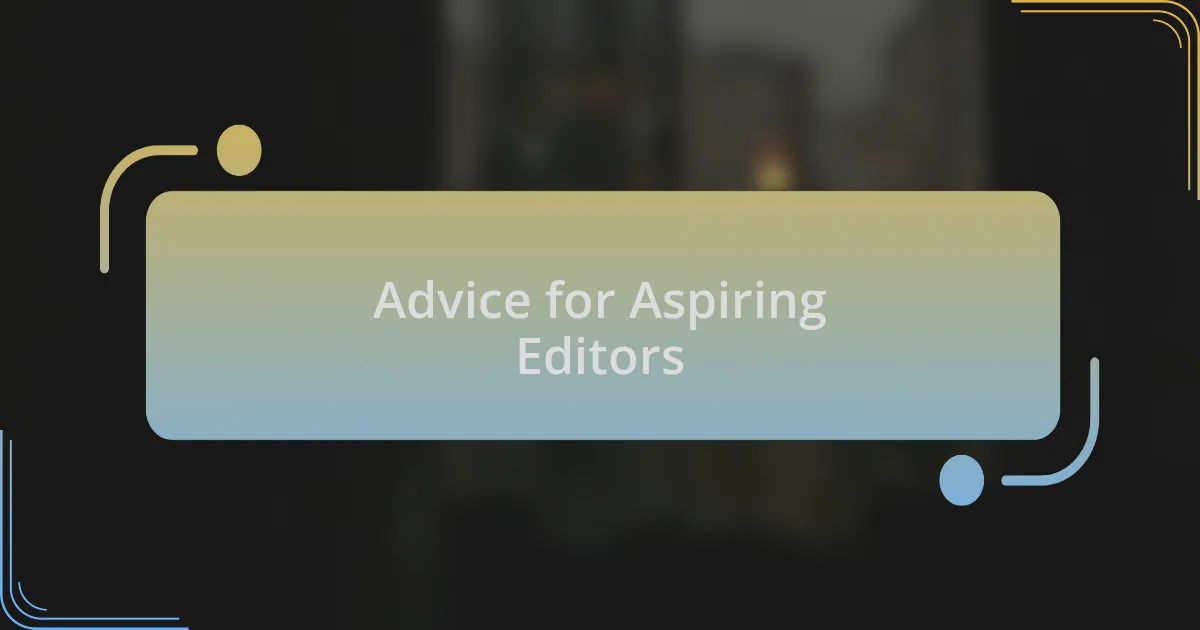
Advice for Aspiring Editors
As an aspiring editor, I firmly believe that building a solid foundation in storytelling is essential. I once worked on a student documentary where I reached a turning point. While editing, I realized I had to think like a storyteller to maintain the narrative flow. Essentially, every cut I made had to serve the story’s overall arc. How often do we sometimes get lost in the technical aspects and forget the essence of what we are trying to convey?
Networking within the film community can be a game changer for editors. I remember attending a local film festival where I met several seasoned editors who generously shared their insights and experiences. These conversations not only inspired me but opened up collaboration opportunities on future projects. It’s remarkable how forging those connections can lead to mentorship and learning opportunities. Have you ever considered how a simple conversation could shape your editing career?
Lastly, never underestimate the power of experimentation. Early in my editing journey, I hesitated to try unconventional techniques, fearing criticism. But when I finally embraced a bold editing style for a passion project, I discovered an entirely new voice in my work. The response was overwhelmingly positive, teaching me that taking risks can be incredibly rewarding. What’s holding you back from exploring your creative limits?